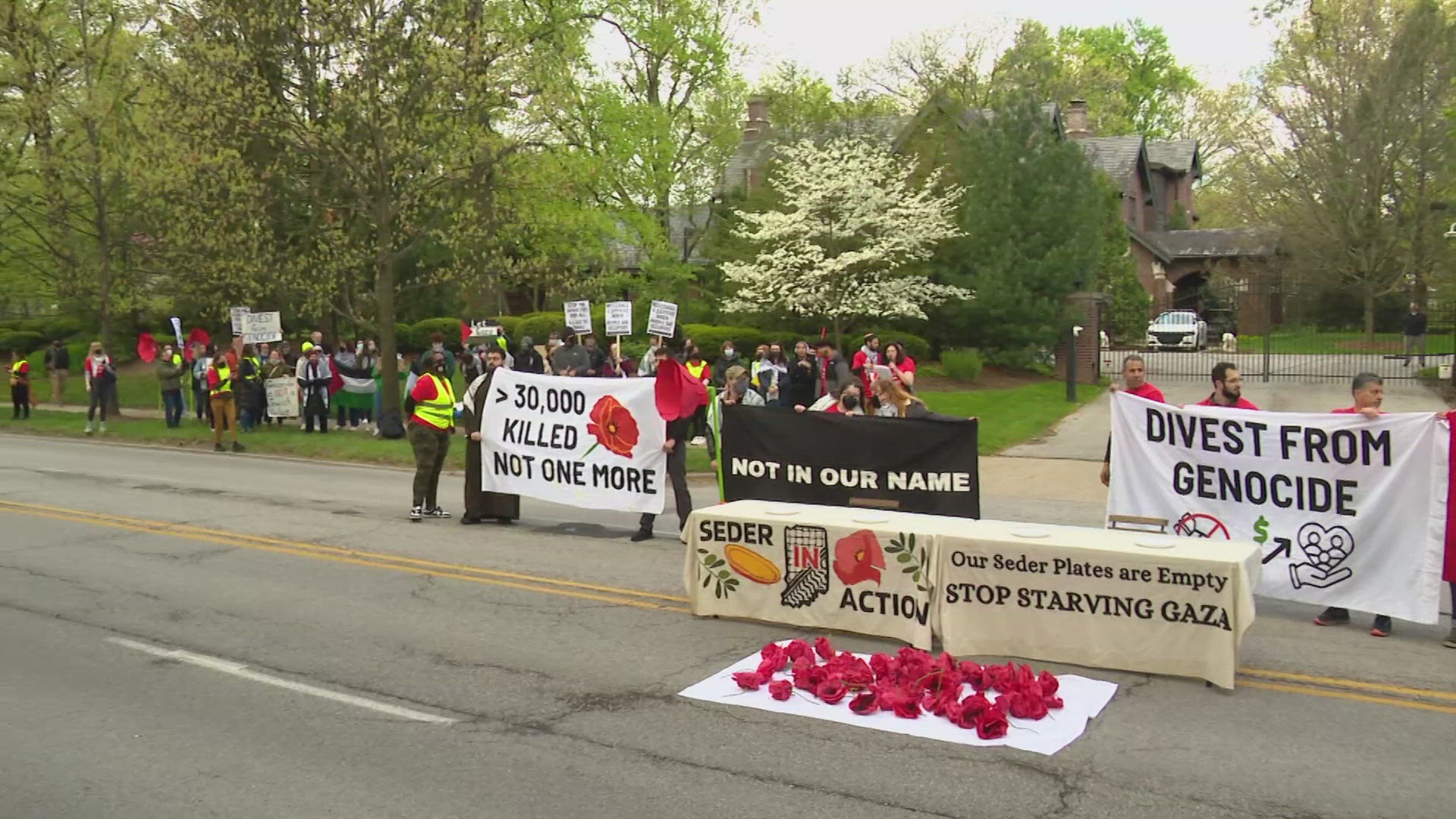INDIANAPOLIS — Fourteen Gaza war protesters were arrested Thursday morning after a gathering near the Indiana Governor's Residence on Indianapolis' north side blocked Meridian Street, IMPD said.
The department said no injuries were reported, and "several of the individuals arrested were not Indianapolis residents."
IMPD posted on social media that Meridian Street was closed between 46th and 49th streets, and asked drivers to find alternate routes.
"IMPD respects and values to right of people to peacefully assemble and protest," the department said. "However, obstructing traffic is unlawful and is subject to arrest."
Around 9:15 a.m. on April 25, a 13News crew at the scene saw officers take multiple people into custody. The crew heard protesters chanting "free, free Palestine" and state they would not leave until everyone was arrested, but protesters were no longer blocking the street as of 9:30 a.m.
IMPD confirmed Meridian Street reopened in both directions, as of 9:40 a.m. However, both directions of 46th Street between Illinois and Meridian streets remained closed.
Jewish Voice for Peace--Indiana, Middle Eastern Student Association of IUPUI, Students for Justice in Palestine--Butler, Palestinian Youth Movement and ANSWER Indiana organized the Thursday morning protest to "demand a permanent ceasefire in Gaza and an end to U.S. aid to Israel."
In a statement, the group said 70 protesters rallied.
"It's just urgent that we stop the genocide now," said an organizer with Jewish Voice for Peace, who did not want to give her name.
It's a message being carried across the world and on college campuses across the nation.
Officers also cracked down on protestors at Indiana University Thursday. According to IU police, 33 people were taken into custody during a protest at Dunn Meadow.
According to police, some of those gathering began to set up tents and canopies, which is a violation of university policy. Officers reportedly told the protestors they could stay in Dunn Meadow if they took down the structures. Once they refused, police advised the group they would have to leave the area.
A final request to remove the structures was made at 3:46 p.m., IU police said in a release. About 10 minutes later, those who still refused to take down the tents were detained and removed from the area.
Indiana University issued the following statement Thursday evening:
"Indiana University Bloomington is a campus where we encourage and respect free speech and open dialogue. To ensure the safety and security of the IU community and to avoid disruption of university operations, expressive activity must be conducted in accordance with university free speech and events policies. This includes the enforcement of policies that require advanced approval for the installation of temporary structures."
IUPUI senior lecturer Pierre Atlas said a ceasefire on its own isn't enough.
"The Oct. 7 attack was launched while under a ceasefire. There's been a ceasefire since 2021. And Hamas violated the ceasefire when they attacked Israel," said Atlas, who's taught Middle East politics for 20 years while at Marian University.
Atlas said that attack was considered the bloodiest day since Israel was created in 1948 and the deadliest day for Jews in the world since the Holocaust.
Atlas said there has to be a peaceful resolution between Israelis and Palestinians.
"I also do not hear from a lot of these protesters any condemnation of Oct. 7 or any willingness to condemn Oct. 7 or willingness to condemn Hamas and they give Hamas a pass. And everything Hamas did on Oct. 7 and since was a war crime," Atlas said.


As protesters continue their fight for a free Palestine, Atlas said the real message may be getting lost.
"If they were also saying, 'Ceasefire now,' 'Release the hostages now, 'Let's move toward a two-state solution where Israel has a right to exist,' a lot of the protesters, the language their using, the rhetoric they're using, is actually also advocating the elimination of the state of Israel," Atlas said.
Saving human lives, he said, is the best resolution.
"Both Palestinians and Israelis have a right to their own states, and that's ultimately what the resolution has to look like. We're a long way from there, and there are people on both the Israeli side and the Palestinian side who do not want a two-state solution," Atlas said.
A top Hamas political official told The Associated Press the Islamic militant group is willing to agree to a truce of five years or more with Israel and that it would lay down its weapons and convert into a political party if an independent Palestinian state is established along pre-1967 borders.
The comments by Khalil al-Hayya in an interview Wednesday came amid a stalemate in months of talks for a ceasefire in Gaza. The suggestion that Hamas would disarm appeared to be a significant concession by the militant group officially committed to Israel’s destruction.
But it's unlikely Israel would consider such a scenario. It has vowed to crush Hamas following the deadly Oct. 7 attacks that triggered the war, and its current leadership is adamantly opposed to the creation of a Palestinian state on lands Israel captured in the 1967 Mideast war.
The war in Gaza has dragged on for nearly seven months and ceasefire negotiations have stalled. The war began with the deadly Oct. 7 attack on southern Israel in which Hamas-led militants killed about 1,200 people, mostly civilians. Militants dragged some 250 hostages into the enclave. The ensuing Israeli bombardment and ground offensive in Gaza has killed more than 34,000 Palestinians, most of them women and children, according to local health authorities, and displaced some 80% of Gaza's population of 2.3 million.
Israel is now preparing for an offensive in the southern city of Rafah, where more than a million Palestinians have fled to.

